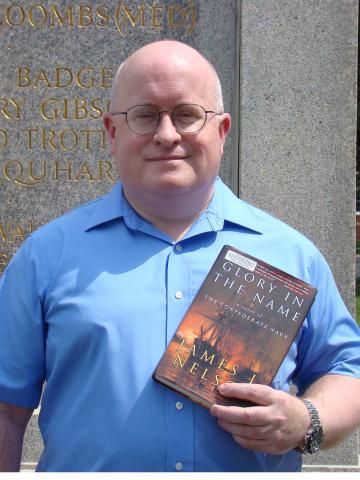
This summer, I’ve been introduced to the works of James Nelson, a maritime novelist and naval historian of the age of sail. I read first George Washington’s Great Gamble (2010), his history of naval warfare in the American Revolution, and in particular the decisive Battle of the Capes; now I’ve finished his Civil War volume, Glory in the Name: A Novel of the Confederate Navy. (Yes, Virginia, the Confederacy had a navy, although most of its squadrons are described as ‘mosquito fleets’, consisting of captured vessels, converted merchantmen, and tugboats armed as gunboats for coastal and river defense.) Nelson is a son of Lewiston, Maine, and a mid-coast resident who uses local libraries for his obviously extensive research. In his pages of Acknowledgements, he thanks the Bowdoin College Library staff for their courtesy! His brief dust jacket biography makes it plain that Nelson is himself really a seafaring man, and his prose incorporates just enough nautical language to be flavorful and engaging, without being tiresomely obscure: lanyards and halyards, topgallants and sheets and shrouds. One enthralling narrative technique Nelson employs is to alternate chapters between land and sea. In George Washington’s Great Gamble, the movements of the British and French fleets across the Atlantic and between the North American and West Indies stations are interspersed with episodes of land campaigns – Clinton occupying New York, Cornwallis marching through the Carolinas, and Arnold and Simcoe raiding up the Virginia tidewater peninsulas. In Glory In the Name, we alternate between the nautical protagonist Samuel Bowater, a lieutenant who commands first the CSS Cape Fear, and a trio of Mississippi brothers who fight, with or without their regiment, at Manassas Junction. The parallel story lines make for cliff-hanging chapters, and it was a great temptation either to peek ahead at later pages, or to stay up way past my bedtime reading. Samuel Bowater is an estimable hero: a Charleston patrician with the artistic eye of an amateur painter, and the dour courage under fire of a naval officer long bred in the old traditions of the service – more grit than Ashley Wilkes and not so loud as Rhett Butler! I knew I’d found a fictional friend when I read, as Bowater takes his seat in a railway carriage, “There was little he hated more than idle talk foisted on him by some cretinous stranger, so he tried to make himself look as inhospitable as he could, to discourage anyone from sitting beside him.” Bowater’s eloquent lament over the arrival of steam engine mechanics with their loud, very hot, and dirty machinery in the graceful world of sailing ships may be James L. Nelson’s own sentiment. The Civil War was a turning point in naval warfare as ironclads propelled by steam screws made winds and currents irrelevant. Before their noisy intrusion, an old admiral of long service might have turned his hand progressively to every task on shipboard since he began as a cabin boy. Complex engines made sailing masters dependent on an essentially alien class of mechanical technicians. Nelson began his publishing career with a couple of series of age-of-sail novels (including pirates!), and only later ventured to write history. I’ve enjoyed Glory in the Name, but I think his history is better. In Glory, the startling exploits of a female character, Wendy Atkins, strain at our credulity. (Even her name is a minor anachronism; ‘Wendy’ was first coined by J. M. Barrie, the author of Peter Pan.) And a historical novelist faces subtle quandaries: Should an omniscient author in 2004, voicing the thoughts of his 1860s character, write ‘baseball’ or ‘base ball’? Modern idiom, or period? I am eager to turn next to Nelson’s other volumes of history: Benedict Arnold’s Navy: the Ragtag Fleet that Lost the Battle of Lake Champlain But Won the American Revolution (2006), and George Washington’s Secret Navy: How the American Revolution Went to Sea (2008).


James L. Nelson’s (now functioning) Web site:
http://jameslnelson.com/